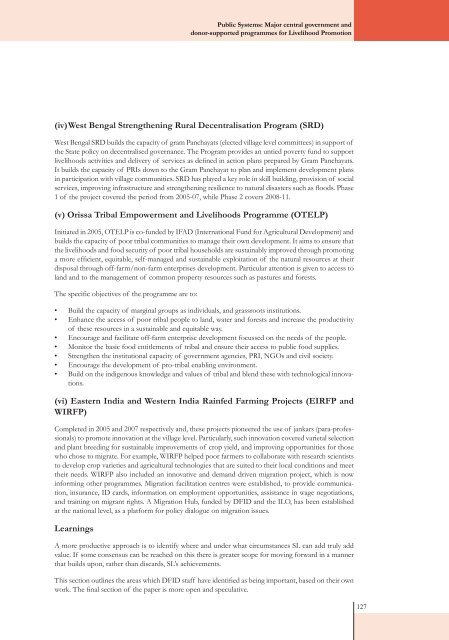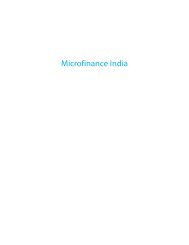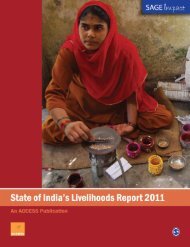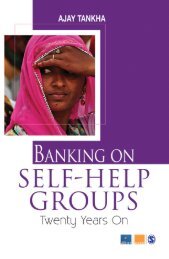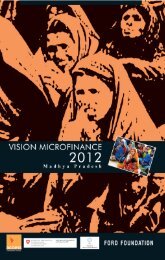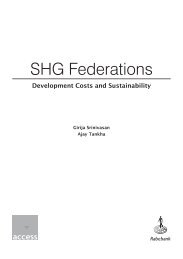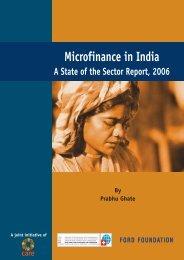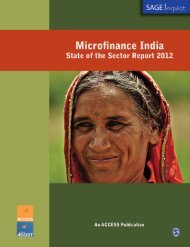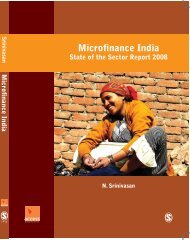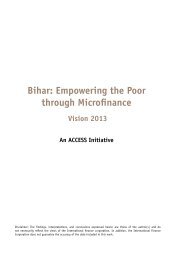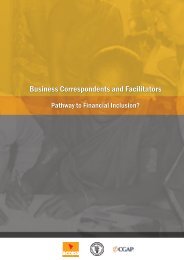Chapter Vfocuses on the poor and vulnerable: tribal populations, SCs, women, landless and displaced households,migrant and casual labourers.The primaryconstraints facedby MPRLPin accessingfinancial servicesare inappropriateproducts andprocedures, inadequateoutreachof distributionchannels anddistorted financialbehaviourThe project has adopted an interlinked two-track strategy. Firstly, by strengthening the resource basethat generates livelihoods; and then by fostering microenterprises that provide employment and incomeopportunities to the rural poor. It seeks to improve land, water and forest resources of poor peoplethrough integrated watershed management and community forest management. The second track seeksto promote enterprises that lead to value-addition of agricultural and forest produce as well as othermicroenterprises. Multiple livelihoods strategies of the project also include migrant labour support andaccess to information.DFID provided Rs 114.87 crore over three years (2004-’07) to support the first phase of MPRLP in 822villages of eight predominantly tribal districts namely Badwani, Dhar, Jhabua, Mandla, Dindori, Anuppur,Shahdol and Sheopur. In the second phase (2007-2012), the project is expected to cover about 4,000villages in the same districts including the 822 villages of the first phase. A total of £45 million (Rs 357crore) for five years has been provided by DFID for improving the livelihoods of the poor.Recognising the vulnerability of migrant labourers, planned support programmes will concentrate ondeveloping bargaining skills, technical expertise and disseminating information on rights at the villagelevel. The second phase will develop and implement its gender strategy, defining participation norms forwomen, reflecting not just representation but participation in decision-making as well.The project is being implemented by the Madhya Pradesh Society for Rural Livelihoods Promotionwhich is registered under the M.P. Society Act. A steering group gives the overall strategic direction forthe Livelihoods Forum and development of the work programme. The Departments of Tribal Welfare,Forests, Agriculture, Animal Husbandry and the SHG Directorate are closely involved with the projectboth at the district and state levels. MPRLP also aims to collaborate with NGOs for capacity building,action research and information dissemination.The primary constraints faced by MPRLP in accessing financial services are inappropriate products andprocedures, inadequate outreach of distribution channels and distorted financial behaviour among thetarget groups,(iii) Western Orissa Rural Livelihoods Project (WORLP)Western Orissa Rural Livelihoods Project (WORLP), a joint venture between the state government ofOrissa initiative and DFID, is managed by the Orissa Watershed <strong>Development</strong> Mission. This project isintended to benefit the poorest people. The activities of the project mainly relate to livelihood initiation,drinking water, sanitation and capacity building. The ten-year-long programme was initiated in August2000.WORLP aims to promote the adoption and replication of effective approaches to sustainable rurallivelihoods by government agencies and other stakeholders in poor districts in Western Orissa by adoptingan innovative approach to watershed development called Watershed Plus. The approach adoptedfocuses on building, and working with, people’s existing strengths and resources, enabling, initiating andempowering appropriate choices for long-term well being. It involves all sections of rural society acrosscaste, class, gender and other divides.The four WORLP project districts − Bargarh, Balangir, Kalahandi and Nuapara − are among thepoorest in India. Health indicators are poor, there is a shortage of safe drinking water and droughtrecurs regularly. Inequitable social structures, distorted land distribution, indebtedness, and gender andother inequities contribute to the widespread poverty in western Orissa and impede access by poor andmarginalised people to resources.126
Public Systems: Major central government anddonor-supported programmes for Livelihood Promotion(iv) West Bengal Strengthening Rural Decentralisation Program (SRD)West Bengal SRD builds the capacity of gram Panchayats (elected village level committees) in support ofthe State policy on decentralised governance. The Program provides an untied poverty fund to supportlivelihoods activities and delivery of services as defined in action plans prepared by Gram Panchayats.It builds the capacity of PRIs down to the Gram Panchayat to plan and implement development plansin participation with village communities. SRD has played a key role in skill building, provision of socialservices, improving infrastructure and strengthening resilience to natural disasters such as floods. Phase1 of the project covered the period from 2005-07, while Phase 2 covers <strong>2008</strong>-11.(v) Orissa Tribal Empowerment and Livelihoods Programme (OTELP)Initiated in 2005, OTELP is co-funded by IFAD (International Fund for Agricultural <strong>Development</strong>) andbuilds the capacity of poor tribal communities to manage their own development. It aims to ensure thatthe livelihoods and food security of poor tribal households are sustainably improved through promotinga more efficient, equitable, self-managed and sustainable exploitation of the natural resources at theirdisposal through off-farm/non-farm enterprises development. Particular attention is given to access toland and to the management of common property resources such as pastures and forests.The specific objectives of the programme are to:• Build the capacity of marginal groups as individuals, and grassroots institutions.• Enhance the access of poor tribal people to land, water and forests and increase the productivityof these resources in a sustainable and equitable way.• Encourage and facilitate off-farm enterprise development focussed on the needs of the people.• Monitor the basic food entitlements of tribal and ensure their access to public food supplies.• Strengthen the institutional capacity of government agencies, PRI, NGOs and civil society.• Encourage the development of pro-tribal enabling environment.• Build on the indigenous knowledge and values of tribal and blend these with technological innovations.(vi) Eastern India and Western India Rainfed Farming Projects (EIRFP andWIRFP)Completed in 2005 and 2007 respectively and, these projects pioneered the use of jankars (para-professionals)to promote innovation at the village level. Particularly, such innovation covered varietal selectionand plant breeding for sustainable improvements of crop yield, and improving opportunities for thosewho chose to migrate. For example, WIRFP helped poor farmers to collaborate with research scientiststo develop crop varieties and agricultural technologies that are suited to their local conditions and meettheir needs. WIRFP also included an innovative and demand driven migration project, which is nowinforming other programmes. Migration facilitation centres were established, to provide communication,insurance, ID cards, information on employment opportunities, assistance in wage negotiations,and training on migrant rights. A Migration Hub, funded by DFID and the ILO, has been establishedat the national level, as a platform for policy dialogue on migration issues.LearningsA more productive approach is to identify where and under what circumstances SL can add truly addvalue. If some consensus can be reached on this there is greater scope for moving forward in a mannerthat builds upon, rather than discards, SL’s achievements.This section outlines the areas which DFID staff have identified as being important, based on their ownwork. The final section of the paper is more open and speculative.127
- Page 3 and 4:
State of India’s Livelihoods :The
- Page 5 and 6:
ChapterPage NoForeword 6Preface 8Ab
- Page 8:
ForewordAs a part of its microfinan
- Page 11 and 12:
employment growth, these sectors we
- Page 14:
RIAARMKRRBRSVYSCSC/STsSCPSCSPSERPSE
- Page 20 and 21:
Chapter Iresponse, risks and shocks
- Page 23 and 24:
OverviewTable 1.2 Employment and Un
- Page 25 and 26:
OverviewA recent paper by Arjun Sen
- Page 27:
Overview4. How is the livelihood st
- Page 31 and 32:
Overview5.2 Manmade constraints - i
- Page 33 and 34:
Overviewthe late 1980s, these two m
- Page 35 and 36:
OverviewIn the 1970s, the Chipko mo
- Page 37 and 38:
Overviewsocial responsibility (CSR)
- Page 39 and 40:
OverviewBox 1.3 Bihar - Underdevelo
- Page 42 and 43:
4040
- Page 44 and 45:
Chapter IIAn enumeration of the dep
- Page 46 and 47:
Chapter IIBox 2.1 Macro Level Livel
- Page 48 and 49:
Chapter IIIn addition to the above,
- Page 50 and 51:
Chapter IIFig 2.1: Poverty Ratio am
- Page 52 and 53:
Chapter IIPoormigrantlabouroften su
- Page 54 and 55:
Chapter IIInterestingly, the Govern
- Page 56 and 57:
Chapter IIThe effective cost of nat
- Page 58 and 59:
Chapter IIsector and thereby casual
- Page 60 and 61:
Chapter IIReferences1. Aiyar , Swam
- Page 62 and 63:
Chapter IIIto, the vulnerability co
- Page 64 and 65:
Chapter IIIIt would be useful here
- Page 66 and 67:
Chapter IIIof new employment opport
- Page 68 and 69:
Chapter IIIinterest subvention - wo
- Page 70 and 71:
Chapter III6. The 11th Plan propose
- Page 72 and 73:
Chapter IIIBox 3.5: Rural Business
- Page 74 and 75:
Chapter III9. The achievement of ge
- Page 76 and 77:
Chapter IIIaid. The Plan also seeks
- Page 78 and 79: Chapter IIIand health. They point o
- Page 80 and 81: Chapter IIIReferences1. Ambasta, Pr
- Page 82 and 83: 8080
- Page 84 and 85: Chapter IVtransport, storage, commu
- Page 86 and 87: Chapter IVing of ‘English Speakin
- Page 88 and 89: Chapter IVWhile these livelihoods h
- Page 90 and 91: Chapter IVTable 4.6 Employment with
- Page 92 and 93: Chapter IVConstruction requires no
- Page 94 and 95: Chapter IVgains in manufacturing ha
- Page 96 and 97: Chapter IV10. A Spatial Perspective
- Page 98 and 99: Chapter IVA quick glance at some of
- Page 100 and 101: Chapter IV12. Once a watershed is d
- Page 102: Chapter IVThrougha range ofschemes
- Page 105 and 106: Public Systems: Major central gover
- Page 107 and 108: Public Systems: Major central gover
- Page 109 and 110: Public Systems: Major central gover
- Page 111 and 112: Public Systems: Major central gover
- Page 113 and 114: Public Systems: Major central gover
- Page 115 and 116: Public Systems: Major central gover
- Page 117 and 118: Public Systems: Major central gover
- Page 119 and 120: Public Systems: Major central gover
- Page 121 and 122: Public Systems: Major central gover
- Page 123 and 124: Public Systems: Major central gover
- Page 125 and 126: Public Systems: Major central gover
- Page 127: Public Systems: Major central gover
- Page 131 and 132: Public Systems: Major central gover
- Page 133 and 134: Civil Society InitiativesChapter VI
- Page 135 and 136: Civil Society InitiativesThe human
- Page 137 and 138: Civil Society Initiativesso far has
- Page 139 and 140: Civil Society Initiativesan 8 per c
- Page 141 and 142: Civil Society InitiativesThe cooper
- Page 143 and 144: Civil Society Initiativeslimited ir
- Page 145 and 146: Civil Society Initiativesintelligen
- Page 147 and 148: Civil Society InitiativesOutboard M
- Page 149 and 150: Civil Society InitiativesCase Study
- Page 151 and 152: Civil Society InitiativesReferences
- Page 153 and 154: The Contribution of Corporate Suppl
- Page 155 and 156: The Contribution of Corporate Suppl
- Page 157 and 158: The Contribution of Corporate Suppl
- Page 159 and 160: The Contribution of Corporate Suppl
- Page 161 and 162: The Contribution of Corporate Suppl
- Page 163 and 164: The Contribution of Corporate Suppl
- Page 165 and 166: The Contribution of Corporate Suppl
- Page 167 and 168: The Contribution of Corporate Suppl
- Page 169 and 170: The Contribution of Corporate Suppl
- Page 172 and 173: Chapter VIII170
- Page 174 and 175: Chapter VIIIcountry that make the e
- Page 176 and 177: Chapter VIIIFig 8.4: All-India area
- Page 178 and 179:
Chapter VIIIWhen commercial crops l
- Page 180 and 181:
Chapter VIIIunit of risk settlement
- Page 182 and 183:
Chapter VIIIPublic capitalformation
- Page 184 and 185:
Chapter VIII8. Integrated Rural Dev
- Page 186 and 187:
Chapter VIIIAn expertpanel ‘sreco
- Page 188 and 189:
Chapter VIIIHowever as final wage s
- Page 190:
188
- Page 193 and 194:
appENDIX TableTable A.1.3: Distribu
- Page 195 and 196:
appENDIX TableEmploymentEmploymentG
- Page 197 and 198:
appENDIX TableTable 2: Employment S
- Page 199 and 200:
appENDIX TableTable 4: State Wise G
- Page 201 and 202:
appENDIX TableTable-7: Distribution
- Page 203 and 204:
appENDIX TableDams and Displacement
- Page 205 and 206:
appENDIX TableFig. A.3.2: High Pote
- Page 207 and 208:
appENDIX TableTable A.3.2Table 2: S
- Page 209 and 210:
appENDIX TableChapter IV - ANNEX TA
- Page 211 and 212:
appENDIX TableAnnex A.5.1Backward R
- Page 213 and 214:
appENDIX TableAnnex A.5.3Some UNDP
- Page 215 and 216:
appENDIX TableGross Value of Output
- Page 217 and 218:
Mona DikshitMona Dikshit has been a


